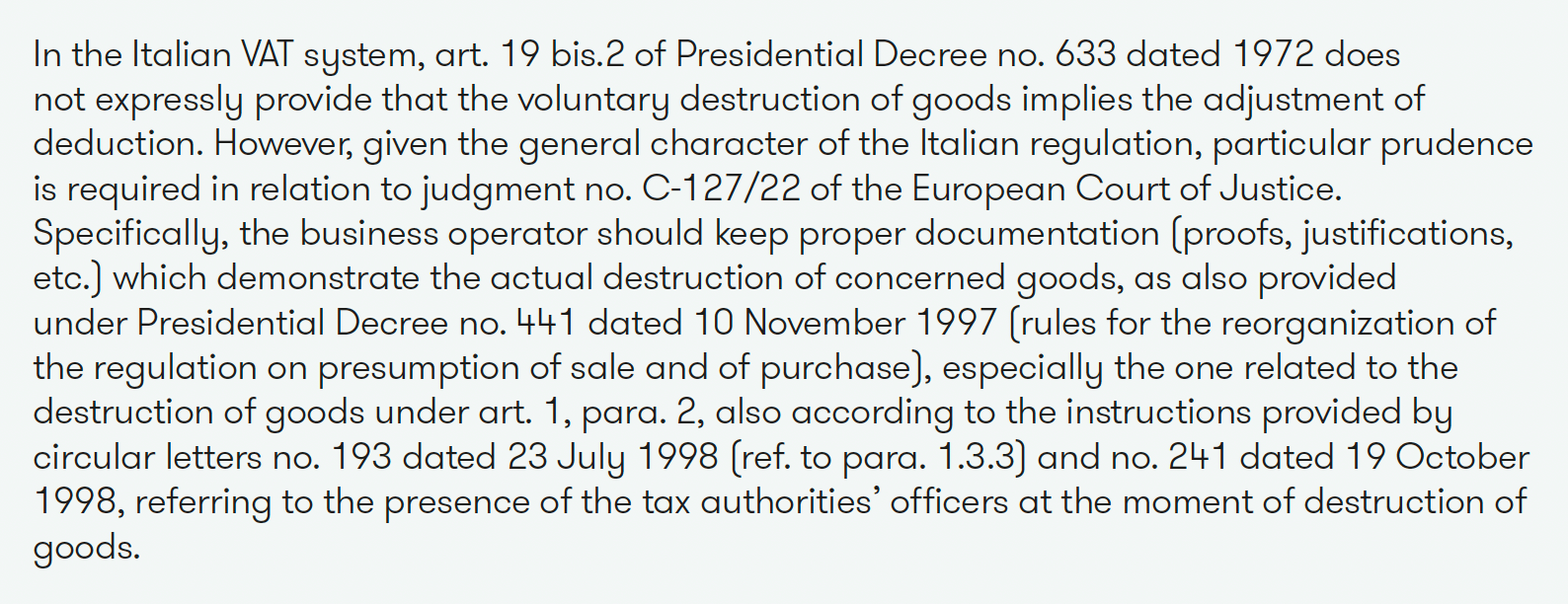Judgment of the European Court of Justice no. C-127/22 dated May 4, 2023, BTK case
By Mario Spera - Principal of Bernoni Grant Thornton
With judgment C-127/22 dated May 4, 2023, BTK case, the European Court of Justice deals with the VAT treatment of goods purchased, produced, or sold by a taxable person, which are written off, destroyed, or disposed, focusing on whether it is necessary to adjust the deduction of input VAT paid or not.
In particular, the Court analysis focuses on the provisions under articles 184 to 186 of VAT directive no. 2006/112, concerning the right of the Tax Authority to require a taxable person to make an adjustment of the VAT deduction previously applied, making reference to the provisions of art. 185 of the above directive, according to which the adjustment of the deduction applied is required when “some change occurs in the factors used to determine the amount to be deducted”. The same article provides, under para. 2, that no adjustment shall be made “in the case of destruction, loss or theft of property duly proved or confirmed”.
a. Sale of “written off” goods
This question concerns the write-off of "goods which the taxable person considered to have become unusable in the course of his or her usual economic activities, followed by the sale of those goods”, which was subject to VAT, even if such goods are qualified as waste.
To this regard, it is important to consider that, in order to ensure complete neutrality of taxation, deduction is based on two substantial requirements (also highlighted, in the Italian legislation, under art. 19 of Presidential Decree no. 633 dated 26 October 1972): inherence (pertinence of the transaction to the activity carried out by the taxable person) and relation ( close and direct relationship between goods or services purchased and their use for taxable output transactions). The Court highlighted that, regardless of the aim and result of the activities carried out downstairs, it is important that “they are themselves subject, in principle, to VAT”. If the subjection to VAT of such activities is verified, the deduction of input VAT is not prejudiced, therefore no adjustment is required.
To this aim, the fact that the sale of goods as waste does not fall within the usual business activity of the taxable person, as well as that the sale value of goods is reduced compared to the initial one (since they are resold as “waste”) is irrelevant. Similarly, the partial destruction of original goods and the resale of their waste being subject to VAT (since they are taxable operations) justifies the maintenance of the original deduction, since it can be affirmed that no “change occurs in the factors used to determine the amount to be deducted” (ref. to art. 185 of VAT directive, para. 1).
b. Loss or voluntary destruction of goods
This is the case concerning the write-off of goods which have become unusable in the course of the usual economic activities of the taxable person, followed by their voluntary destruction.
To this regard, a distinction should be made between “loss”, which is not voluntary and could be the result, for example, of disastrous events or a theft, and “destruction”, which is voluntary and due to which goods are eliminated and cannot be used any more. In both cases, the aim of the legislator is to avoid that a “tax” loss of concerned goods is added to their economic loss, thus implying an increased damage for operators. Therefore, the law provides for some hypotheses that do not require the adjustment of deduction.
While it is quite evident that the loss of goods, which does not depend on the will of a business operator, should be considered as an event that does not impact the right to deduct VAT, the case of destruction is more complex, since the taxable person voluntarily eliminates the concerned goods.
In particular, the European Court of Justice deems that the write-off or voluntary destruction of goods, falling within the usual business activity, does not require the adjustment of deduction (i.e., the repayment to the tax authorities of deducted VAT), even if such goods are not aimed at a taxable activity, as long as such destruction is “duly proved or confirmed” and it can be demonstrated that the concerned goods have “objectively lost all usefulness in the taxable person’s economic activities”.
To this end, the “proof of destruction” could be a certificate issued by the tax authorities or a notary that ascertains the physical elimination of the concerned goods. The same is valid in case of disposal of goods.



